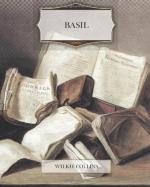In person, my father was of not more than middle height. He was very slenderly and delicately made; his head small, and well set on his shoulders—his forehead more broad than lofty—his complexion singularly pale, except in moments of agitation, when I have already noticed its tendency to flush all over in an instant. His eyes, large and gray, had something commanding in their look; they gave a certain unchanging firmness and dignity to his expression, not often met with. They betrayed his birth and breeding, his old ancestral prejudices, his chivalrous sense of honour, in every glance. It required, indeed, all the masculine energy of look about the upper part of his face, to redeem the lower part from an appearance of effeminacy, so delicately was it moulded in its fine Norman outline. His smile was remarkable for its sweetness—it was almost like a woman’s smile. In speaking, too, his lips often trembled as women’s do. If he ever laughed, as a young man, his laugh must have been very clear and musical; but since I can recollect him, I never heard it. In his happiest moments, in the gayest society, I have only seen him smile.
There were other characteristics of my father’s disposition and manner, which I might mention; but they will appear to greater advantage, perhaps, hereafter, connected with circumstances which especially called them forth.
IV.
When a family is possessed of large landed property, the individual of that family who shows least interest in its welfare; who is least fond of home, least connected by his own sympathies with his relatives, least ready to learn his duties or admit his responsibilities, is often that very individual who is to succeed to the family inheritance—the eldest son.
My brother Ralph was no exception to this remark. We were educated together. After our education was completed, I never saw him, except for short periods. He was almost always on the continent, for some years after he left college. And when he returned definitely to England, he did not return to live under our roof. Both in town and country he was our visitor, not our inmate.
I recollect him at school—stronger, taller, handsomer than I was; far beyond me in popularity among the little community we lived with; the first to lead a daring exploit, the last to abandon it; now at the bottom of the class, now at the top—just that sort of gay, boisterous, fine-looking, dare-devil boy, whom old people would instinctively turn round and smile after, as they passed him by in a morning walk.




